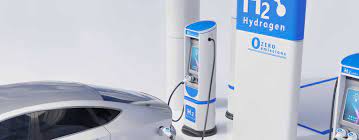
Southwest Research Institute (SwRI) has created a joint industry program (JIP) that will retrofit a Class 8 heavy-duty vehicle with a hydrogen engine to demonstrate the low impact potential of hydrogen-powered engines using current technology.
“The new initiative will create a working demonstration of current technology’s capabilities for decarbonization and achieving zero or near-zero emissions of both greenhouse gasses and criteria pollutants,” said Dr. Terry Alger, executive director of SwRI’s Sustainable Energy and Mobility Directorate. “We believe that sustainably sourced hydrogen in an internal combustion engine (ICE), when used in combination with other decarbonization and clean emissions technologies, can provide low emissions that are competitive with both battery and fuel-cell electric vehicles.”
The SwRI-managed Hydrogen Internal Combustion Engine (H2-ICE) JIP aims to design and build a working H2-ICE vehicle. The vehicle will house an on-board emissions measurement system to demonstrate that an H2-ICE can power a low emission, heavy-duty vehicle, while producing near-zero carbon dioxide (CO2) emissions and ultra-low emissions of nitrogen oxides (NOx) and particulate matter pollution.
Parts for the vehicle’s construction will be supplied by JIP members. SwRI will integrate its best-in-class, ultra-low NOx aftertreatment technology, originally developed to help diesel engines meet California Air Resources Board (CARB) regulatory standards for target date 2027. CARB is charged with combatting air pollution in the country’s most populous state.
SwRI has decades of experience working with regulatory agencies, vehicle manufacturers and suppliers to address emissions challenges. Once completed, the H2-ICE vehicle will be tested to ensure it aligns with standards in the Phase III Greenhouse Gas Rules to be set by the U.S. Environmental Protection Agency (EPA) in 2023 and the 2027 CARB regulations for heavy-duty vehicles, as well as the anticipated EURO VII rules for heavy-duty vehicles.
“Battery electric and fuel cell-powered vehicles tend to take up the majority of the conversations surrounding zero-emission vehicle technologies,” Alger said. “Through this program, we are working with industry to ensure that current technology, like internal combustion engines, are not left out of the decarbonization conversations by federal and state regulators. We have a significant number of industry members and donors sharing hardware to show the potential of H2-ICE technology.”
Once completed, the H2-ICE vehicle will make appearances at trade shows and ride-and-drive events across the country to demonstrate the technology’s potential as a realistic pathway for decarbonization. The targeted vehicle completion date is December 2023 with vehicle demonstrations planned throughout 2024.
The kick-off meeting for the H2-ICE JIP took place on November 10, 2022, at SwRI headquarters in San Antonio. The JIP will be managed by SwRI with majority approval of a project advisory committee. Arising intellectual property will be owned by SwRI and shared with funding members. For more information about the JIP, contact Alger at terry.alger@swri.org <mailto:terry.alger@swri.org> .
For more information on SwRI consortia, visit https://www.swri.org/swri-cons
About SwRI:
SwRI is an independent, nonprofit, applied research and development organization based in San Antonio, Texas, with more than 3,000 employees and an annual research volume of nearly $726 million. Southwest Research Institute and SwRI are registered marks in the U.S. Patent and Trademark Office. For more information, please visit www.swri.org











More Stories
Is Your 70 Series Land Cruiser Underperforming? Here’s How to Unleash Its True Potential
What to Do After a Motorcycle Accident to Protect Yourself
Injured in a Motorcycle Crash? Talk to an Attorney Now